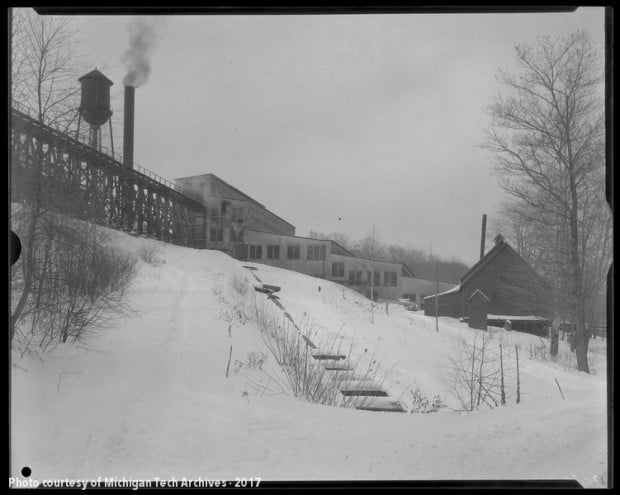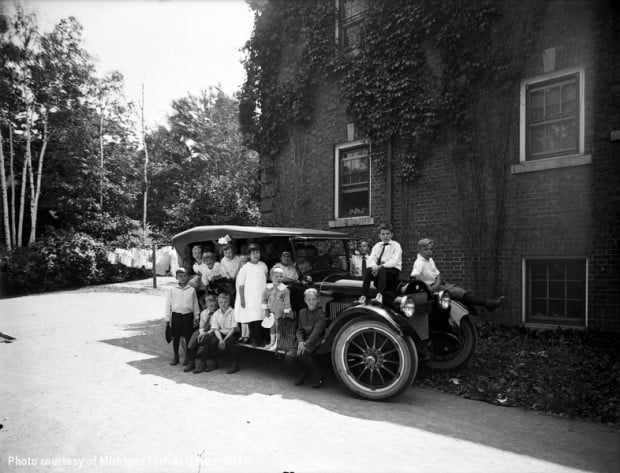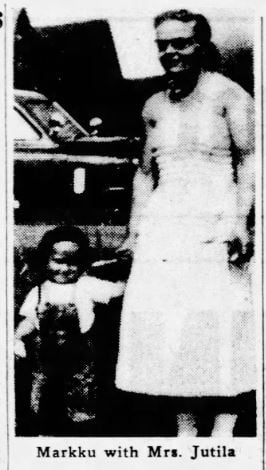Part 1 of 2.
His mother named him Chester. The ones responsible for his death called him Markku.
He died far before his time in December 1958–not yet seven years old. Born in Houghton County, he spent his entire short life in the Copper Country. He should have been buried with dignity in his hometown. Instead, his body was found abandoned under a culvert in Ozaukee County, Wisconsin, just north of Milwaukee.
For nearly seventy years, the identity of the little boy treated so cruelly in life and death remained a suspicion but not a certainty. A faint shadow of doubt hanging over the case prevented prosecution while the culpable parties lived. Now, persistent work led by the Wisconsin Department of Justice’s Criminal Investigation team and supported by the Ozaukee County Sheriff’s Office, the Wisconsin State Crime Lab, the University of Wisconsin Oshkosh, and many others–including the Michigan Tech Archives–has allowed an innocent child victim to be given his rightful name and his history.
Chester Alfred Breiney was born in Houghton County on February 26, 1952, according to probate court documents. No legal record captured his father’s name. His mother, Josephine Breiney, had turned twenty the previous summer. A native of Houghton, she was the youngest child of a May-December marriage. Her father, long-time stamp mill worker Jacob Breiney, was at least 43 when he wed his eighteen-year-old bride, Michigan-born Anna Haller. Jacob had apparently changed the spelling of the family name from Breinig to make it phonetic for English speakers.

Josephine’s eighth birthday was still several months away when her father died from heart problems in April 1939. Although Jacob had been in poor health since his departure from the Isle Royale mill in 1932, the coroner described his actual passing as sudden. The Breineys laid their husband and father to rest in Houghton’s Forest Hill Cemetery.
Life in the wake of Jacob’s death proved challenging. Over the next several years, Josephine’s sisters–the younger of whom was six years her senior–married and left the nest. Anna Haller Breiney began to battle severe mental illness in her middle age. Doctors diagnosed her with “involutional melancholia,” a term developed to describe psychiatric afflictions they frequently associated with women entering menopause. Symptoms of Anna’s condition would today be understood as bipolar disorder or schizophrenia, potentially presenting with depression. In January 1948, she was committed to Newberry State Hospital. Only two weeks later–February 9, 1948–she died from “exhaustion due to mental illness.” Her body was returned to Houghton for burial.
What relationships Josephine might have had with her married sisters, her ill mother, and her one brother–seventeen years older–will never be known with certainty, now that all are long deceased. Yet, even if they were strong and loving, it seems impossible to fathom that her mother’s mental health and early death could have been anything other than earthquakes in the life of a sixteen-year-old girl. As she moved from traumatic adolescence into young adulthood, her path crossed–through a love affair, a one-night stand, or an act of violence–with the man who would father Chester.
Nine months after her son’s birth, the probate court of Houghton County declared Josephine unable to care for him to its satisfaction. Like most local children whose parents had received this decision, he was sent to Houghton’s Good Will Farm. Minister F.A. Holtzhausen founded the organization in 1899, concerned for the children left fatherless by mine accidents. The first orphanage and school, situated on an actual farm, had given way to a large brick house adjacent to the Michigan Tech campus; that house provided one of the few options for regional foster care in the middle of the 20th century. Area residents who wished to adopt a child turned with hope to the Good Will Farm for placements.
Enter William Russell Jutila and Hilja Puska Jutila.
William was a local boy, one of at least ten children of Michael (Mikko) and Alida Jutila of Torch Lake Township and a graduate of Lake Linden High School. In his twenties, he came upon a picture of a young divorcee in Finland in his aunt’s home and felt a spark of attraction. William’s aunt arranged for the two to correspond, and a romance blossomed. Hilja sailed to the United States in May 1950. Within days of her landing in America, she and William exchanged vows in Chassell. Eighteen months after the wedding, the thirty-something couple remained childless, and they applied to the Good Will Farm as prospective adoptive parents.

In November 1952, the home notified William and Hilja that it had received custody of a little boy named Chester by order of the probate court. Would the Jutilas be interested in fostering him? Yes, they said, they would. Chester was placed in their Franklin Township home that same day.
Both Hilja and William later recalled meeting Josephine Breiney at least once and learning something of her story, but she appears to have been cut out of her son’s life soon after.
Chester’s formal adoption followed on March 24, 1955. By this time, he had been given a new name in keeping with his adoptive parents’ heritage: Markku Edward Michael Jutila. William and Hilja spoke Finnish as their first language and taught Markku to speak it, too. By the time he started school, he apparently understood very little English; news reports conflicted later about whether this lack of comprehension arose from being totally immersed in Finnish or from a learning difficulty. William would claim a mental disability for Markku when it was convenient. Like so many other details surrounding William and Hilja’s story, however, Markku’s special needs may have been a fiction.
Markku’s life as the Jutilas’ son appears to have turned tragic long before his death. An alleged picture of the toddler with Hilja, printed in the Chicago Tribune, shows exactly what one would expect to see when mother and son are photographed together: contented smiles, entwined hands, clear familiarity with each other. Yet happy images disguised a dark reality. Medical examiners found evidence that Markku had received a broken rib not long before his death–a sign of a home where punishment was severe or rage directed toward the powerless.
December 1958 arrived. Christmas approached. Snow fell. Markku went to school. William, who had had to leave his mine job after a foot injury two years earlier, puttered about the house. Hilja cooked and hung clothes out to dry–her only option, even in a Copper Country winter. Then, one day, the pattern of their lives abruptly changed, and Markku’s came to a horrifying end.
William and Hilja claimed, when they were first interrogated, that their son had come home sick from school and been recuperating in bed. Before the couple could grasp the seriousness of his condition, he died. They could not afford a doctor or an undertaker, William said, so they leaped into their car, clutching Markku’s body, and sped away.
Dinner remained cooking on the stove. The laundry still flapped on the line. When relatives dropped by later, they found every sign that the Jutilas had left hurriedly but with every intention to return soon. They would not, in fact, come back to the Copper Country for almost a decade–nor tell a soul where they had gone.

As the long winter night grew darker, William and Hilja pressed south into Wisconsin. Mile after mile slipped away behind them; hour after hour brought them closer to a plan. They neared Mequon, a city of 8,000 that had recently incorporated to avoid annexation by its much larger neighbor, Milwaukee. Spotting a culvert, they pulled the car over and slid out with Markku’s lifeless body. Working quickly, they unceremoniously hid the son they had committed to protect underneath the culvert and left him behind. The Jutilas sped from Mequon toward Chicago, toward anonymity and no one who knew that they had once had a sweet little boy.
Over the years that followed, William and Hilja convinced themselves that they had escaped. Then the pieces of the puzzle that they had scattered between their old lives in Hancock and their hideaway in the Windy City fell into place, and the police arrived at their door.
Markku had died on a December day, with winter settling in for the long haul. When the knock came at the Jutilas’ new home on the south side of Chicago, the calendar read March. Almost eight years had passed: spring 1966 had just arrived. Until late 1965, William and Hilja had taken care not to disclose their whereabouts to William’s kin. Hilja became the breadwinner, cleaning a building downtown. After seven years of mystery and distance, something spurred William to write to two of his brothers back in Houghton County and let them know where he was. The older men quickly made the long trip to Chicago soon thereafter, no doubt as much to satisfy their curiosity about their little brother’s sudden disappearance as to reunite with him, with Hilja–and with their adopted son.
The arriving Jutila brothers expected to meet a boy in his early teens at William’s home. They found instead his conspicuous absence. William told them that Markku had been placed in a special home for mentally disabled children. When the brothers returned for a subsequent visit, he claimed that Markku was simply playing elsewhere in the neighborhood. The evasiveness, combined with William’s years-long silence and his abrupt flight from the Copper Country, raised his brothers’ suspicions. They had already worried about their nephew; now darker fears colored their anxieties. Back home, they approached the Houghton County sheriff’s department and expressed their concern that something terrible had happened to Markku. Someone, they said, needed to go to Chicago and confront William and Hilja.
The men knocking at the Jutilas’ door that late March day represented two police departments: a sergeant and two detectives from the Chicago police force accompanied Houghton County deputy A. Frans Heideman on his visit. The Jutilas let them inside, and questioning quickly began. Where was Markku? What had happened to him? William and Hilja evidently had never thought to prepare for their day of reckoning, and now they hurried to coordinate their stories. They spoke in Finnish to each other as they worked, surely feeling confident that their native tongue would shield the conversation from the police.
But Deputy Heideman, scion of a Lutheran ministerial family, spoke Finnish as well as the Jutilas did and understood every incriminating word.
The second part of Chester Breiney’s/Markku Jutila’s story, the thwarting of justice, and the involvement of the Michigan Tech Archives in putting the case to rest will follow in a blog post next week. If you suspect a child is being abused in your community, we encourage you to bring your concerns to the authorities and advocate for his or her welfare. Be a voice for the voiceless like Chester, and, in his memory, help to prevent another tragedy.
I grew up in Coburntown and knew Russell and Hilja my entire life. The house they lived in still stand there on the corner of 2nd and the Center St. Still has the same red fake-brick asphalt siding on it. The house I grew up in is east of theirs on the corner of 2nd and Quincy St. It has green siding on it now. When I was a kid, my Dad told me the story about how Russell (I never knew him as William) and Hilja killed that kid, and how a neighbor woman named Nancy Laakso knew what happened, but refused to testify against Hilja and Russell. Maybe out of loyalty to fellow Finns, maybe out of fear. Or maybe Nancy was just as psychotic as Hilja no doubt was. Russell would never give anyone the impression of being capable of murder but his wife always gave me a creepy vibe. When my mother was hospitalized with cancer in early 1987, Hilja was also diagnosed-they put her in the same room as my Mom. The Jutilas are even buried next to my parents in the Oscar Cemetary outside of Houghton. It’s a damn shame they were never held accountable for killing an innocent little kid. Maybe they’re paying for it now. One can hope.
Thank you for this article! My mom was Markku’s neighbor in Coburntown and remembers playing with him outside. She said he was always happy to play with her and some of the other neighborhood kids. They rode tricycles up and down the street. My mom always wondered what really happened to him. She and other family and friends suspected that Hilja did kill him, though they wanted to believe it was an accident. But everyone knew she was a bad alcoholic. I even remember her and Russell living in Coburntown and we could hear her screaming in the backyard at Russell or their dogs when she was drinking. Such a sad story, but thank you for giving us some closure.